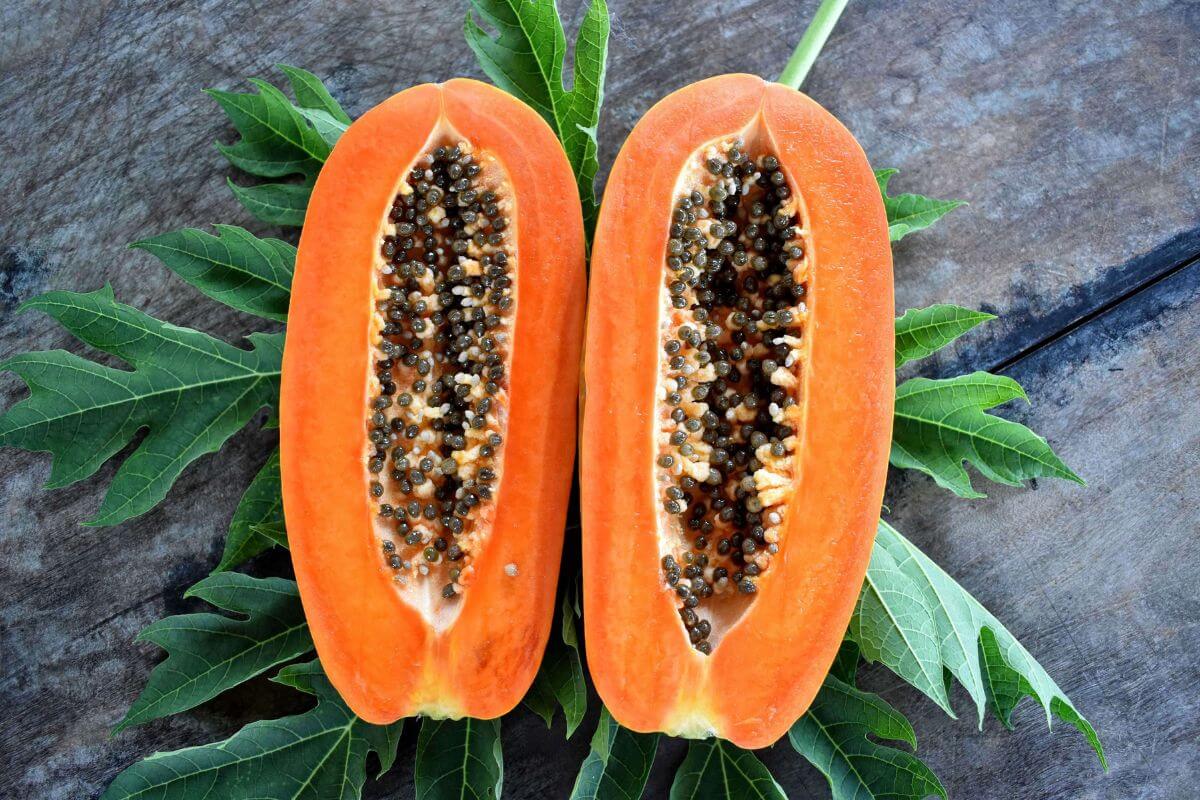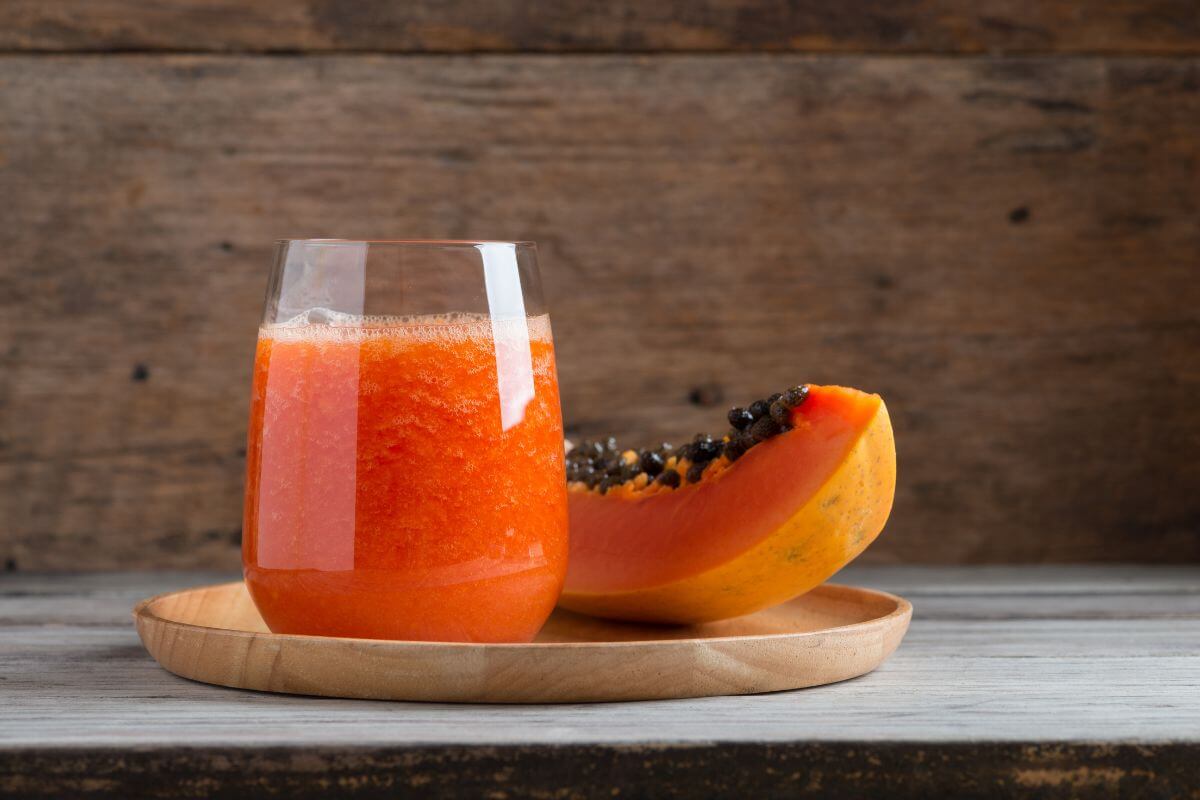Is papaya a fruit or vegetable? It’s a question that might pop up while you’re slicing into this tropical delight. You may be curious if the sweet and juicy papaya you enjoy in your fruit salad can also be considered a vegetable.
I’ll dive into the botanical and culinary worlds to answer this intriguing question. From its classification as a berry to its use in savory dishes, you’ll discover why papaya fits both categories. I’ll explore its characteristics, nutritional profile, and how it’s used in different cuisines.
So, are you ready to uncover the true nature of papaya? Keep reading to find out if this versatile plant belongs in your fruit bowl or your vegetable drawer. You might be surprised by what you learn!
- Related article: Telling Apart Fruits and Vegetables
5 Key Takeaways on Is Papaya a Fruit or Vegetable
- Papaya is a fruit because it has female reproductive organs, contains seeds, and develops from the fertilized ovary of the papaya plant.
- Ripe papayas are used in sweet dishes like desserts, jams, and syrups. They are rich in natural sugars and vitamins like vitamin C.
- Unripe green papayas are used in savory dishes. They can be considered vegetables in cooking because the term “vegetable” often refers to taste and use rather than botanical definitions.
- Papayas support heart health, improve gut health, improve skin and hair health, and have antioxidant and anti-inflammatory properties. They may also have anticancer effects due to their rich nutrient and antioxidant content.
Is Papaya a Fruit or Vegetable?

Papaya or Carica papaya is a tropical fruit from Central America. Here’s why it’s considered a fruit:
- Botanical Definition – It has female reproductive organs.
- Contains Seeds – Fruits have seeds.
- Product of Fertilized Ovary -We eat the enlarged ovary that produces seeds.
- Classification as a Berry – It develops from one flower ovary and is fleshy with seeds.
- Sweet Fleshy Pulp – Its sweet, fleshy pulp is a fruit trait.
- Nutritional Profile – High in natural sugars and vitamins like vitamin C.
- Usage in Food Preparation – Eaten raw or in desserts, jams, and syrups.
But papaya can also be seen as a vegetable:
- Culinary Usage – “Vegetable” often refers to taste and cooking use.
- Unripe Green Papayas – Used in savory dishes like vegetables.
- Edible Parts of a Plant – Vegetables are edible plant parts, including fruits used in certain dishes.
- Savory Cuisine – Green papayas are used in savory dishes.
- Preparation in Dishes – Unripe papaya is cooked like a vegetable.
Papaya fits both categories based on how it’s used and its characteristics.
What Are the Health Benefits of Papaya?

Papaya is a source of vitamin C and other nutrients that benefit your body. Even papaya seeds are nutritious. Those small black seeds contain vitamins A and E. These vitamins help your immune system and improve skin and heart health. Let’s explore what else this fruit offers.
1. Papayas Support Heart Health
You can protect your heart by eating foods rich in vitamin C and lycopene. These nutrients reduce the risk of heart disease.
Papaya is a great option because it has high levels of antioxidants. These antioxidants improve good cholesterol and protect your heart. So, eating papaya can help your heart stay healthy. It also lowers the risk of heart disease.
Papaya has other benefits too. Its antioxidants, fiber, and potassium lower cholesterol and blood pressure. They also reduce inflammation. These are all key factors in preventing heart disease.
One study showed that a fermented papaya supplement improved the ratio of bad LDL to good HDL cholesterol. This means papaya can be a powerful ally for your heart.
2. Papayas Help Improve Gut Health

Papaya fruit has an enzyme called papain. It breaks down tough protein chains in meat. This is why people use papaya to tenderize meat.
You can also use papaya to treat constipation and Irritable Bowel Syndrome (IBS). The leaves, seeds, and roots help with ulcers too.
The fiber, enzymes, and high water content in papaya fruit support digestion. They can ease constipation, bloating, and IBS symptoms. People have used papaya for ulcers for a long time.
3. Papayas Help Improve Skin and Hair Health
Papaya does wonders for your skin too. Wrinkles and sagging happen as we age because of free radicals in our bodies.
Lycopene and vitamin C protect your skin from the sun and reduce aging damage. They also help lessen wrinkle depth.
Papaya’s vitamin A, vitamin C, and antioxidants in papaya keep your skin healthy. They fight signs of aging like wrinkles and sun damage. The enzymes also boost hair growth and moisture.
4. Papayas Have Antioxidant and Anti-inflammatory Properties
Papaya packs a punch when it comes to fighting off harmful stuff in your body. It’s loaded with good-for-you things like vitamins C and E. These vitamins team up with other helpers called carotenoids and flavonoids. Together they knock out those pesky free radicals that can cause trouble.
But that’s not all! Papaya also helps calm down inflammation. This is great news for your health. Research shows papaya can be a real lifesaver for people dealing with tough conditions. It helps reduce stress in the body for folks with Alzheimer’s, prediabetes, thyroid issues, and even liver problems.
Want to grow your own papaya plant? It’s easier than you might think! With a little care, you can have fresh papaya right in your backyard. Plus, tending to a papaya plant can be a fun and rewarding hobby.
5. Papayas Have Potential Anticancer Effects
Papaya packs a powerful punch against cancer. Its compounds like lycopene and vitamin C fight oxidative stress in your body. This helps lower your risk of certain cancers.
Research shows papaya has a special knack for battling breast cancer cells. If breast cancer runs in your family, eating foods high in vitamin C might cut your risk.
Why not add some juicy papaya to your diet? It’s a tasty way to boost your health. Plus, it’s versatile. You can enjoy it fresh, blended in smoothies, or even grilled. Have you tried papaya before? If not, now’s the perfect time to give it a shot. Your body will thank you for the cancer-fighting boost.
Different Ways to Add Papaya to Your Diet

When you add papaya to your diet, ripeness is key. For raw eating, it should have orange-red skin.
A ripe papaya feels soft with light pressure. Its flavor is best when cold and pairs well with many foods.
Papaya is popular worldwide because of its exotic flavor. You can enjoy it raw, cooked, juiced, frozen, dried, or canned.
Here are some delicious ways to add more papaya to your diet:
Salads and Salsa:
- Add papaya chunks to chicken, tuna, or shrimp salad.
- Make a papaya salsa with black beans, tomatoes, onions, cilantro, and lime juice to serve with grilled fish or chicken.
- Toss papaya with avocado, grapefruit, and greens for a refreshing salad.
Smoothies and Juices:
- Blend papaya with banana, yogurt, and milk for a creamy smoothie.
- Add papaya to your favorite fruit juice or make a papaya-based juice.
Appetizers and Snacks:
- Serve papaya strips with prosciutto or other cured meats for a tasty appetizer.
- Skewer papaya chunks with other tropical fruits like pineapple and mango.
- Enjoy dried papaya as a sweet and chewy snack.
Desserts and Baked Goods:
- Bake papaya halves with cinnamon and sugar for a unique dessert.
- Make papaya jam or chutney to spread on toast or scones.
- Add papaya to muffins, quick breads, or pancakes for extra moisture and flavor.
Grilled and Cooked Dishes:
- Grill papaya halves until tender and caramelized.
- Sauté papaya with onions, garlic, and spices as a side dish.
- Incorporate papaya into curries, stir-fries, or rice dishes.
Whether you have papaya trees in your backyard or pick up unripe fruit from the store, these tips will help you enjoy papaya in many delicious ways.
Is Papaya a Fruit or Vegetable? Final Thoughts
Papaya is a tasty treat that wears two hats. It’s both a fruit and a veggie! You can munch on it solo or mix it up with other foods for a flavor explosion.
Want to boost your health game? Papaya’s got your back. This tropical wonder packs a punch with nutrients, vitamins, and minerals. Plus, it’s loaded with fiber to keep your tummy happy.
But wait, there’s more! Papaya can work wonders for your skin, giving you that healthy glow. And let’s not forget about your ticker — papaya’s a real heart helper.
The best part? It’s a breeze to add to your meals. No papaya trees in your yard? No problem! Just swing by the grocery store when they’re in season. Grab one and get ready to jazz up your plate.
Is Papaya a Fruit or Vegetable FAQs
1. When Is Papaya a Vegetable?
An unripe papaya is a vegetable version of the fruit.
2. What Type of Fruit Is a Papaya?
Papaya, like honeydew melons and cantaloupes, is a berry fruit.
3. Is a Papaya a Vegetable or a Non Vegetable?
Though it’s not a vegetable, you can add it to savory dishes. Its slightly sweet taste works well in salads or salsas.
For other plants you may be wondering if they’re fruit or vegetable, check out these articles:

